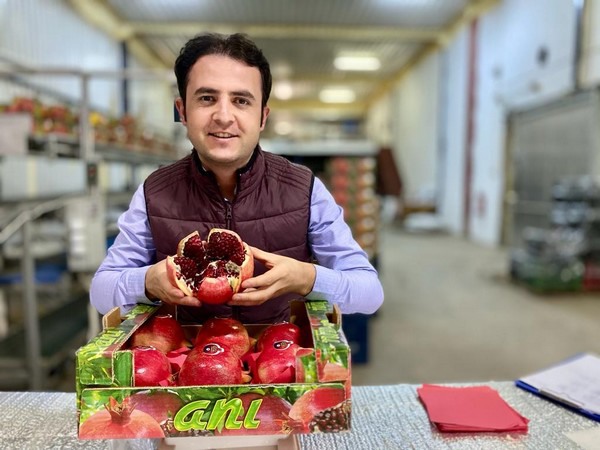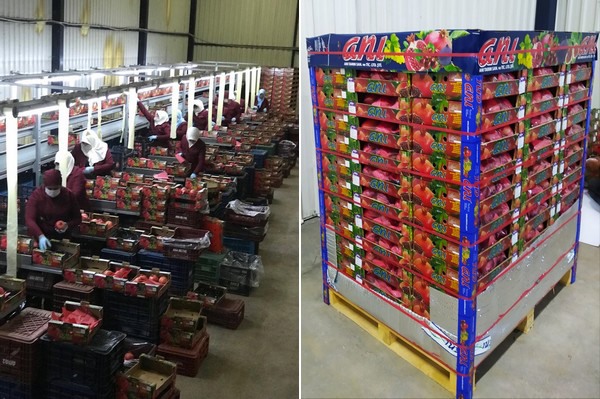The Turkish pomegranate season is well underway and so far the season for one exporter has been positive. More production will hopefully lead to higher revenue, and despite the challenges that the pandemic brings with it, demand for and consumption of pomegranates has actually increased in most markets.
According to Mehmet Cakmak, the sales and marketing manager for Anı Tarım Fresh Fruit, the Turkish pomegranate season is going well, with higher production thanks to good weather conditions: “We observed that the 2020 pomegranate production and harvest season in Turkey has gone well, thanks to good weather conditions during blooming and ripening periods, albeit some rainy days in the early weeks of harvest in October. The product quality is high in general. We procured 2400 tons of Hejaz variety pomegranates by the contracted-local growers from Denizli and Antalya regions this season, which is 300 tons more compared to the last season’s quantity. We’re able offer all calibers (5-6-7-8-9-10 and 12) in carton, wooden or plastic packaging to our clients. Local procurement prices were higher than the last season due to increases on input costs at the national level.”

When comparing the season to last season, both more production and revenue are expected for the Turkish pomegranates, Cakmak states. “Turkey produced 559,171 tons pomegranate in 2019 and exported about one third of it, generating 97.4 million USD of revenue. For 2020, the total production is estimated to increase by 3 to 6 per cent on a national scale. This ensured Turkey to keep its global rank as one of largest pomegranate producers after Iran, India and China.”
A major challenge has been dealing with Covid-19, which could have affected the demand of pomegranates in a negative way. Thankfully, pomegranate consumption actually increased in 2020, Cakmak explains. “I think the restrictions due to the Corona measures in the markets pose challenges in the demand of fresh fruits. People prefer to spend less time at shopping, and purchase the most necessary products which they need to have in their daily lives or reduce the amount they normally get. Yet, it has been observed that pomegranate consumption in 2020 increased in many countries, as it is considered to have high benefits for health.”

Demand has been rather unstable so far, but Cakmak predicts this will change after the second week of December, as stocks of pomegranates from competing countries are sure to run out by that time. “So far we have been experiencing ups and downs in the pomegranate demands from the European markets. We estimate this may go on until the second week of December, after which we expect orders to come in more regularly. Also, we have been facing a difficulty in the competition against Egyptian pomegranates for the Asian markets, like Singapore and Malaysia at some level. Due to cheaper prices and shorter shipments, the buyers from these markets naturally preferred the Egyptian pomegranates more throughout September and October months. From November on, as the Egyptian pomegranates run out, we expect to deliver more quantity to those markets.”
Anı Tarım has their regular markets in Europe and Asia, but has also managed to reach two new markets for the very first time. “This season we achieved to ship to Canada and Kuwait for the first time in our pomegranate operations. We hope to increase our volumes to these destinations in the coming months. Beyond this, we continue the loadings for our regular clients in Germany, France, Switzerland, Poland and Russia in Europe; Singapore and Malaysia in Asia Pacific.” Cakmak says.

The prices for pomegranates are currently about the same as last season, however as stocks deplete, Cakmak expects prices to rise by the end of the season: “Despite the high purchasing prices in production areas, our export sale prices remain more or less the same compared to last year, but then as it usually repeats itself each year, we foresee the prices start to go up after January just because the stocks diminishes gradually everywhere. Hejaz is the most produced and consumed pomegranate variety in Turkey. It is regularly available from October to March, which is a great advantage for Turkish exporters against other producing countries who do less volume and mostly run out their stocks before that time already.”
Tomorrow Asia Fruit Logistica ON will start and Anı Tarım will participate in the virtual event: “We are going to attend the Asia Fruit Logistica Online Fair as an exhibitor, which will take place on 18-20 November 2020. Considering the negative impacts of Covid-19 globally, we see this digital event as a great opportunity for all companies and people who are in the fresh fruit and vegetable business to meet up online and develop their business activities. On that occasion we’re enthusiastically looking forward to having online meetups with those companies and visitors who are looking for new suppliers and co-operations.” Cakmak concludes.
For more information:
Mehmet Çakmak
Ani Tarım Fresh Fruit Ltd.Co.
Tel: +90 246 334 20 04
Mob: +90 539 850 30 32
Email: marketing@anitarim.com.tr
www.anitarim.com.tr
